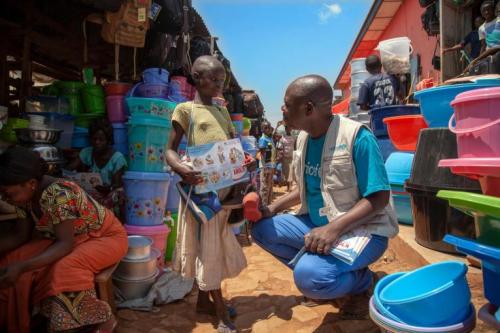UNICEF steps-up support for children ahead of new school year in Ebola affected areas of Eastern DRC
As more than 82,500 children prepare for the new school year in Ebola-affected areas of the Eastern Democratic Republic of the Congo (DRC), UNICEF is scaling up education, health and water, sanitation and hygiene programmes to assist the schools to provide a protective learning environment for children and their teachers.

Jean-Pierre Masuku, UNICEF’s Ebola Outreach Officer in North Kivu in The Democratic Republic of the Congo, discusses Ebola prevention with a girl in Ebola-affected Beni.
The Government of the DRC recently made the decision to proceed as planned with the start of the school year in the affected provinces of North-Kivu and Ituri, where some 250 schools are listed as being in Ebola-affected health zones.
“Education is a right for every child and essential for children to develop to their full potential. Especially in times of crisis such as an Ebola outbreak, schools are vital for children to find stability, learn prevention measures and receive psychosocial support,” said Dr Gianfranco Rotigliano, UNICEF Representative in the DRC following his visit to Mangina, the epicentre of the Ebola-epidemic. “Every effort must go into ensuring a smooth and safe start to the new school year,” he added.
School principals and teachers will receive training on Ebola prevention and protection, and how to educate children on good hygiene practices to avoid the spread of the virus. To ensure schools in the affected health zones are well prepared for early detection and response, UNICEF is distributing health and WASH supplies including laser thermometers, hand washing units and megaphones and prevention posters to each of the 250 schools.
UNICEF and partners are working to:
• train school principals and more than 1750 teachers in the affected health zones about Ebola and protection measures against the virus;
• organise prevention communication activities for parents committees and local authorities on prevention measures in every concerned school;
• prepare teachers to sensitize all children at the beginning of the school year on good hygiene practices to contain the spread of the virus;
• distribute 500 laser thermometers – 2 in each school - to monitor the health situation of children;
• install 1500 hand washing units – 6 in each school – to promote handwashing and hygiene;
• distribute megaphones and prevention posters in every school.
Source:United Nations Children's Fund
- 265 reads
Human Rights
Ringing FOWPAL’s Peace Bell for the World:Nobel Peace Prize Laureates’ Visions and Actions

Protecting the World’s Cultural Diversity for a Sustainable Future

The Peace Bell Resonates at the 27th Eurasian Economic Summit

Declaration of World Day of the Power of Hope Endorsed by People in 158 Nations

Puppet Show I International Friendship Day 2020

